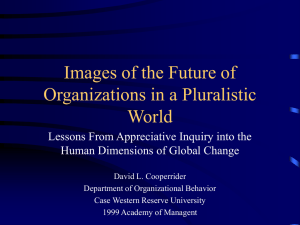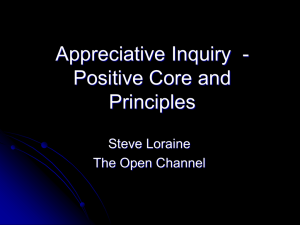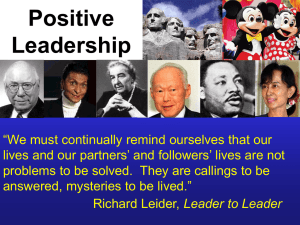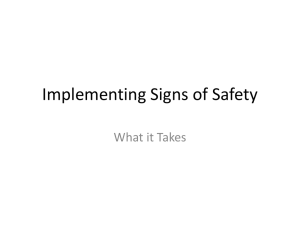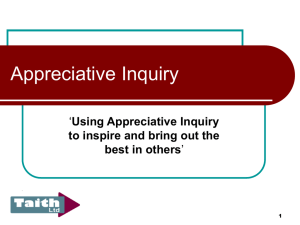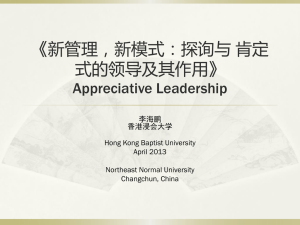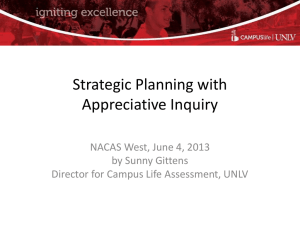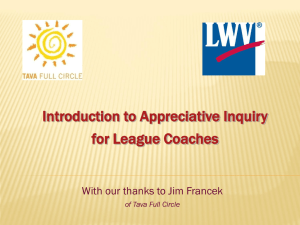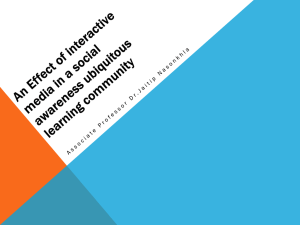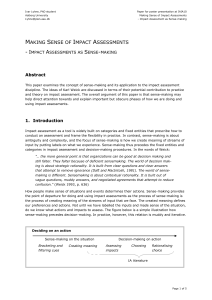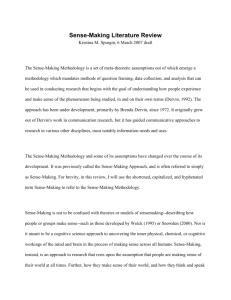Managing Change
advertisement
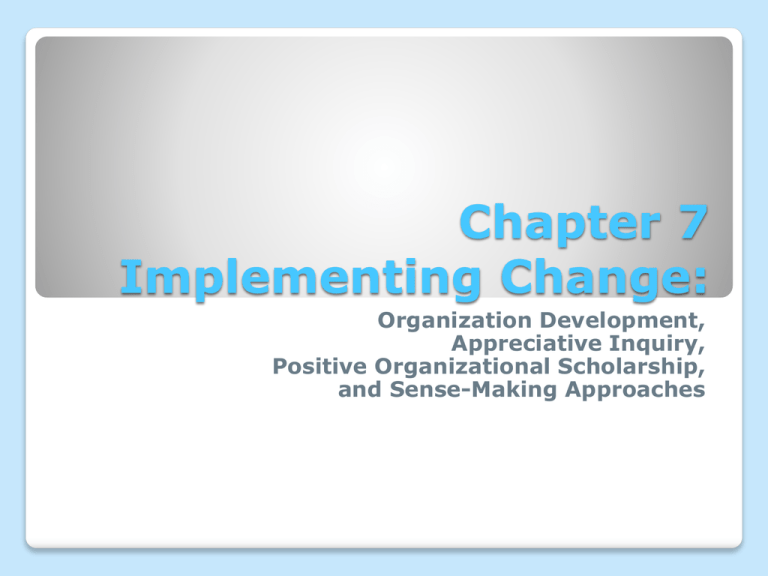
Chapter 7 Implementing Change: Organization Development, Appreciative Inquiry, Positive Organizational Scholarship, and Sense-Making Approaches Images of Managing Change Image Images of Managing Change Approach Chapter 7 Coach Organization Development Appreciative Inquiry Positive Organizational Scholarship These theories and approaches focus on identifying and building on what is working best in the organisation. Interpreter Sense-Making This approach as it alerts managers to the different influence that interpretations of change can have. Organization Development Appreciative Inquiry Positive Organizational Scholarship Sense-Making Approach Rationale Chapter 8 Director Change Management Contingency Theories They focus on strategic and planned organizational change. Intentional change outcomes can be achieved through a series of planned steps. There is certainty that it can be achieved. Navigator Processual Approach The outcomes are the result of a complex interplay of different interests, both internal and external to the organization. Note: The caretaker and nurturer images are not well addressed in the literature because the assumption is that change managers receive rather than initiate change 7-2 Organization Development Images of Managing Change Organization Development Appreciative Inquiry Positive Organizational Scholarship Sense-Making Approach Informed by theories of Lewin, Herzberg, Maslow, Argyris, … It has been the fundamental basis of the change field for a number of years Change is planned, incremental and participative Outcomes are focused on the improved effectiveness of the organization Long-term focus Based upon action research Emphasis on changing the attitudes and behaviors of people Top-down focus 7-3 Organization Development Images of Managing Change Humanistic values --- openness, honesty, integrity Democratic values --- social justice, freedom of choice, involvement Developmental values --- authenticity, growth, self-realization Organization Development Appreciative Inquiry Positive Organizational Scholarship Sense-Making Approach OD emphasises on a core set of values: Change should benefit not just the organization but the people who staff them Are OD values universal? Criticism: The problem of subjectivity. The problem of business strategy. 7-4 Organization Development Images of Managing Change 1. 2. 3. 4. 5. 6. 7. 8. Organization Development Appreciative Inquiry Positive Organizational Scholarship Sense-Making Approach Typical OD steps: Problem identification Consultation with an OD practitioner Data gathering and problem diagnosis Feedback Joint problem diagnosis Joint action planning Change actions Further data gathering and evaluation Classic OD: Lewin’s change process 1. Unfreezing: establishing the need for change 2. Movement: change 3. Freezing: integration of the changes into the system 7-5 Appreciative Inquiry Images of Managing Change Organization Development Appreciative Inquiry Positive Organizational Scholarship Shows a shift from problem solving to joint envisioning of the future Seeks to identify what is currently working best to build on this knowledge to help develop and design what might be achieved in the future Involves a four-step technique. Sense-Making Approach 7-6 Appreciative Inquiry Images of Managing Change Four-D Model By GEM Initiative (Mohr and Magruder Watkins, 2001) Discover Appreciating that which give life Organization Development Appreciative Inquiry Positive Organizational Scholarship Delivery Dream Sustaining the organization’s future Envisioning impact Design Sense-Making Approach Co-constructing the future 7-7 Positive Organizational Scholarship Images of Managing Change Organization Development Appreciative Inquiry Positive Organizational Scholarship Sense-Making Approach Emerged in the early 2000s It encompasses approaches such as Appreciative Inquiry and others including positive psychology and community psychology. Centres on the positive aspects of organizational life. It can be considered a coaching method to assist organizations. It extends rather than replace the problemsolving approaches i.e. the integration of the positive and negative aspects. 7-8 Sense-Making Approach Images of Managing Change ◦ Inertia: On the contrary, organizations undergo constant adjustments to better fit changing circumstances ◦ The need for a standardized change program ◦ Unfreezing: as organizations are in a constant state of flux, they require freezing to analyse change – not unfreezing to begin the process of change Organization Development Appreciative Inquiry Positive Organizational Scholarship Sense-Making Approach It challenges three key assumptions of change: The best Change sequence is as follows: ◦ Freeze ◦ Rebalance ◦ Unfreeze 7-9
